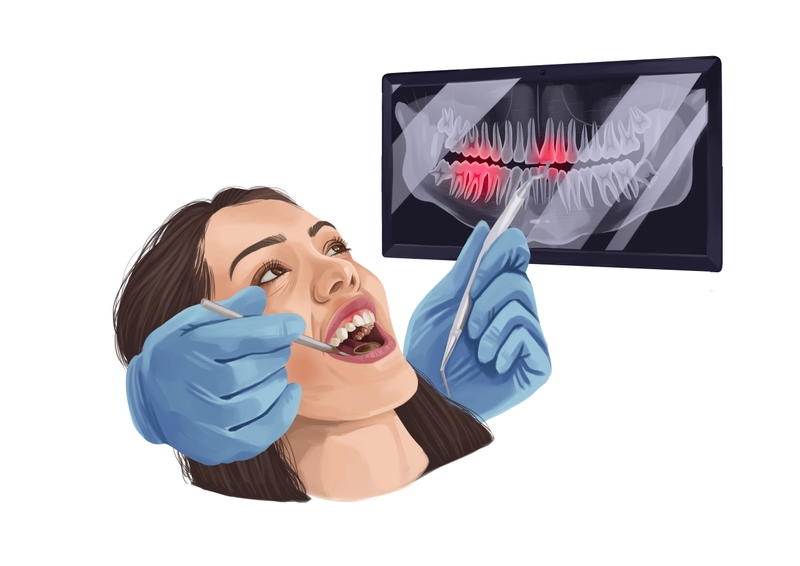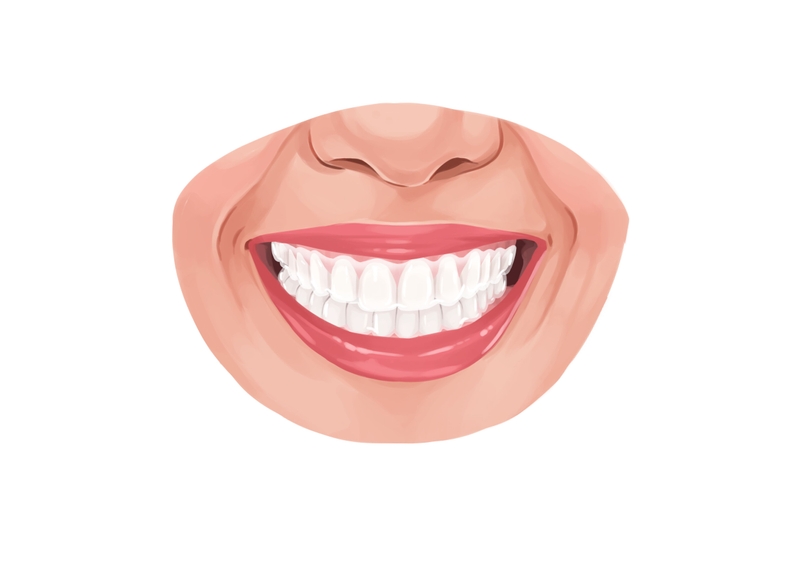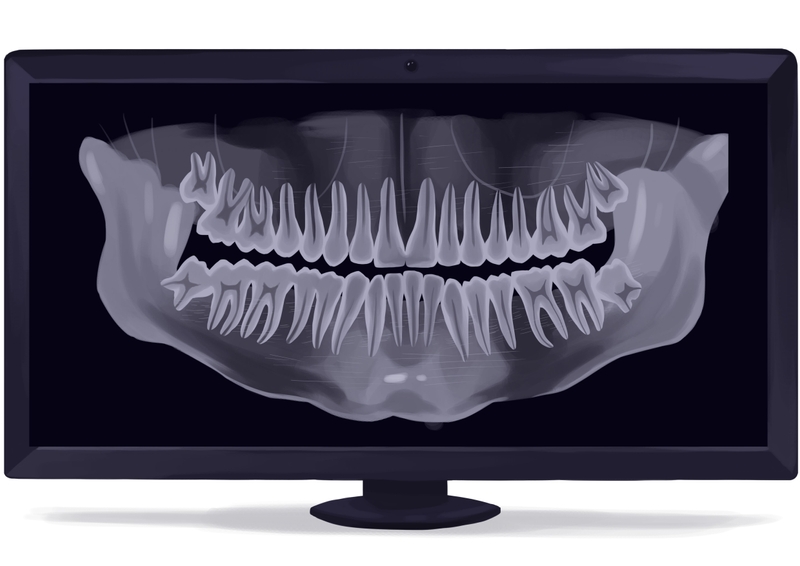- In general, teeth are sensitive to hot or cold foods, sweet or acidic snacks, cold water and cold air, vigorous brushing, flossing, and alcohol-based mouthwashes.
- The root problem depends on the exact factors that trigger the sensitivity. It may be caries or dentin hypersensitivity.
- Depending on the underlying problem, you may need professional treatment or you may be able to reduce the sensitivity with home remedies.
Get your smile ready for anything. Use Authority Dental to find a local dentist open now It’s easy, fast and free.
Do your teeth cause discomfort when you eat or brush them? Here's everything you need to know.
Sensitive tooth symptoms

Picture by Authority Dental under CC 2.0 license
It’s likely you will experience sensitivity in your teeth at some point in your life. A study by the American Family Physician shows evidence that about 22% of US adults do at least once every 6 months.
A problem arises when this happens often or constantly. There are many possible triggers, but the most common reasons for tooth sensitivity symptoms include sharp pain in reaction to:
hot or cold foods,
sweet or acidic snacks,
cold water and air,
vigorous brushing or flossing, and
alcohol-based mouth rinses.
Sensitive tooth causes
Sensitivity to hot, cold, sweet, and acidic foods and drinks is most commonly caused by a cavity. It may not be visible yet, but it’s best to take care of it as soon as possible.
The rest of the symptoms mentioned above are usually the result of dentin hypersensitivity. This condition is prevalent in age groups of 25-40 years and related to several risk factors.
Recent dental procedures
If you’ve had a crown, bridge, or even just a filling done lately, you are likely to experience sensitivity for up to a week, before it subsides on its own. In some cases, it may last as long as 6 months. That’s a normal reaction and there’s no need to be concerned. However, if persistent irritation worries you, consult a dentist.
Tooth whitening is a procedure that almost always causes sensitivity. OTC products like strips and gels tend to have a bigger effect than in-office treatment. Nonetheless, bleaching is invasive and proper aftercare is vital to prevent lasting damage.
Fractures and cavities
Some cavities, cracks and fractures are very small and indiscernible to the eye. Still, they can cause a significant amount of discomfort. This is because tubes that lead directly to nerve endings are exposed and vulnerable to stimuli.
Worn-down fillings or enamel
When enamel is worn down, dentin or cementum becomes exposed. These are a lot less dense. What’s more, they contain tubes and canals to the nerves and cells in the tooth. If this is the case, stimuli like hot or cold foods irritate the tooth and cause sharp pain.
Enamel can be prematurely worn down by:
aggressive brushing,
teeth grinding,
an inappropriate diet,
stomach acid (gastroesophageal reflux, vomiting), or
genetics.
If your brushing is too vigorous or if your toothbrush has bristles that are simply too hard, you can damage the outer layer of your teeth. The same goes for bruxism, which often occurs at night.
A diet high in acidic foods and drinks is very dangerous to the enamel. The substance basically dissolves it, leaving the tooth exposed.
GERD, or gastroesophageal reflux, is a condition that causes stomach acids to come back up into the mouth. Frequent vomiting (from disease, bulimia, or pregnancy-related) may have a similar outcome.
Genetics also play a role, as some people simply have thinner enamel, or may have been born with enamel defects.
Infections
Sinus infections and other inflammation in the skull, even for a while after they are cured, may also cause pain in the teeth and jaws. This is because the swelling increases pressure in the skull. This irritates nerve endings.
Gum issues
Shrinking gums, a condition that is very common after the age of 40, expose cementum, a very sensitive part of your teeth and roots. This can cause significant discomfort and may be a sign of more serious conditions like gum disease.
Periodontitis may lead to a lot of pain and discomfort. Teeth become loose and may even fall out.
What helps sensitive teeth?
When you begin experiencing tooth sensitivity, start at home. Simple solutions often work well. If symptoms persist for more than 2 weeks, report to your dentist.
At-home remedies

Picture by Authority Dental under CC 2.0 license
In most cases, sensitivity can be fixed with proper oral hygiene. Brushing twice a day and flossing every night can do wonders. Make sure you are using the right products, though.
There are a lot of OTC dental treatments for sensitive teeth. Here are the most popular ones:
desensitizing toothpastes,
alcohol-free mouthwash,
soft-bristled brushes,
fluoride dental products, and
mouthguards for those with bruxism.
Many toothpastes have the specific purpose of minimizing sensitivity. They work thanks to desensitizing ingredients that block pain receptors. They also don’t contain any harsh or irritating ingredients, like toothpastes designed to whiten teeth. Desensitizing products often require several applications before effects are tangible.
When choosing a mouthwash, use alcohol-free formulas. Alcohol may dry out your mouth, causing reduced saliva flow. This may demineralize the teeth and speed up the process of enamel wearing down. Drink plenty of water to keep your oral cavity hydrated.
Reduce stress and caffeine intake. Those can lead to bruxism, which is clenching and grinding of the teeth, especially at night. If that doesn’t help, invest in a mouthguard. A hard, custom-made at dental office mouthguard is best for long-term use. Softer ones over the counter can cause jaw muscle issues with prolonged use.
Switching to a toothbrush with softer bristles may also help. Your enamel will wear down more slowly and it will be easy on your gums, preventing recession.

Fluoridation helps remineralize the teeth, making them more resilient to irritating stimuli. Fluoride is commonly included in tap water across the US, but you can also buy special toothpastes and gels.
Changing some of your eating habits will be helpful. Eliminate acids and sugar in your diet. If you do enjoy such snacks, wait at least 30 minutes before brushing your teeth. Use a straw for acidic drinks to minimize contact with the teeth.
Some fruits and vegetables, especially greens can also reduce tooth sensitivity. If you’ve ever explored dental facts, you may know that eating spinach can make your teeth less vulnerable to stimuli. When it binds to your saliva, it makes calcium oxalate crystals, which are sometimes used in dental treatments to manage pain.
Alternative treatment includes saltwater or hydrogen peroxide rinses, cold compresses, and biting on moistened tea bags, vanilla, or guava leaves. Those solutions will not work as quickly as OTC products.
Professional treatments

Picture by Authority Dental under CC 2.0 license
Home remedies are recommended when there is no root issue that may lead to other problems. Otherwise, you will need professional intervention.
The first in-office stage is conducting an oral exam. Your dentist will make sure you have no cavities or miniscule fractures that could be causing the problem. X-rays may be done to check for any warning signs that the human eye can’t detect.
A dentist can prescribe a stronger type of desensitizing toothpaste and mouthwash than OTC products. You may receive a topical gel that will immediately numb your mouth.
If the problem is demineralization, you may receive fluoride treatment. Those come in the form of trays that you keep in your mouth for about 30 minutes a day.
Exposed nerve endings can be treated with resin seals. If your gums have receded so much that exposed cementum is causing the problem, you may need a gum graft. A small piece of tissue is taken from a different area in your mouth and attached around the tooth that is hurting.
Infected dental pulp (like after a large, neglected cavity) is treated with root canals. Dentists rarely remove teeth due to sensitivity.
FAQ
How to stop sensitive teeth pain immediately?
In order to get immediate sensitive pain relief, you can purchase a topical numbing gel.
Stay away from hot and cold foods and drinks, as well as anything you previously noticed was making the discomfort worse.
How to whiten sensitive teeth?
Can you prevent your teeth from being sensitive?
Peter March, DDS
One of the most common desensitizing ingredients is potassium nitrate. It takes about two weeks of use for the full effect.